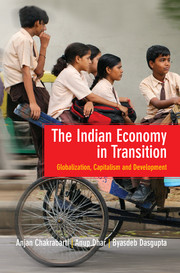Book contents
- Frontmatter
- Contents
- Preface
- Introduction
- Chapter I The Condition of the Working Class in Contemporary India
- Chapter II Capitalism: The ‘Delusive Appearance of Things’
- Chapter III Post-colonial Development and ‘The Thought of the Outside’
- Chapter IV The Word and the World of Neo-liberalism
- Chapter V The Scrypt of Transition: Between the Spectral and the Secret Thereof
- Chapter VI From Self-reliance to Neo-liberalism: The Political Economy of ‘Reform’ (1991–2014)
- Chapter VII Global Capitalism and World of the Third: The Emergent Cartography of the Indian Economy
- Chapter VIII Inclusive Development, State and Violence
- Chapter IX From Economic Crisis to Transition Crisis
- Conclusion
- Bibliography
- Author Index
- Subject Index
Chapter III - Post-colonial Development and ‘The Thought of the Outside’
Published online by Cambridge University Press: 18 December 2015
- Frontmatter
- Contents
- Preface
- Introduction
- Chapter I The Condition of the Working Class in Contemporary India
- Chapter II Capitalism: The ‘Delusive Appearance of Things’
- Chapter III Post-colonial Development and ‘The Thought of the Outside’
- Chapter IV The Word and the World of Neo-liberalism
- Chapter V The Scrypt of Transition: Between the Spectral and the Secret Thereof
- Chapter VI From Self-reliance to Neo-liberalism: The Political Economy of ‘Reform’ (1991–2014)
- Chapter VII Global Capitalism and World of the Third: The Emergent Cartography of the Indian Economy
- Chapter VIII Inclusive Development, State and Violence
- Chapter IX From Economic Crisis to Transition Crisis
- Conclusion
- Bibliography
- Author Index
- Subject Index
Summary
Promoting social inclusion is an important objective of the World Bank. While the social, cultural, and political determinants of social inclusion may be beyond the scope of social risk management, it is essential to recognise the causes and consequences of social exclusion and to design strategies that address these issues.
World Bank, 2001: 11Exclusion and inclusion are perhaps two concepts most in vogue presently, certainly in development and especially in the context of India. In fact, the concepts of exclusion and inclusion are being deployed to redefine in turn the concept development, and in the process form an axis in the transition path of India. This will form the backdrop to the interrogation of ‘inclusive development/growth’ in Chapter 8. Our examination concerns interrogating exclusion and inclusion in relation to the concept development, and demonstrates how the three come to intersect and reinforce one another.
Exclusion and inclusion are intimately connected to the way the idea of the other/Other has taken shape. At a somewhat preliminary level, the ‘small other’ is that which is included in discourse; it is inclusion in terms of the logic-language-ethos of the Self that makes it ‘small other’; while the ‘big Other’, one could call it the Levinasian Other, is that which exceeds inclusion in discourse. At another level, the former is the citation of the Self, the latter is not; the former is assimilated in the discourse of the Self, the latter is that which remains inassimilable, which limits assimilation; more on this as we go along. Preliminarily, let us denote third world as the ‘small other’ and world of the third as the ‘big Other’. Specifically, one could say development fundamentally works over (not with) the other/Other where the other/Other is modelled into various kinds of developmental configurations, inclusion and exclusion being one. However, the concepts of exclusion and inclusion, at least in development literature, seem to rely on some simple, at times naive conception of the other. The domination of the idea of empirical exclusion in institutionalized literature (such as the World Bank) sets the terms of locating, marking and including the excluded; the ‘excluded other’ is as if just ‘out there’ (it is a list, changing with time but a list nevertheless), and so, include ‘it’.
- Type
- Chapter
- Information
- The Indian Economy in TransitionGlobalization, Capitalism and Development, pp. 67 - 97Publisher: Cambridge University PressPrint publication year: 2015



